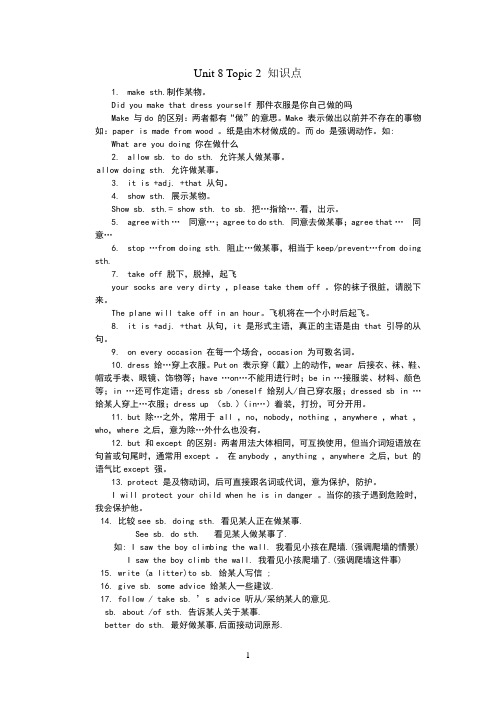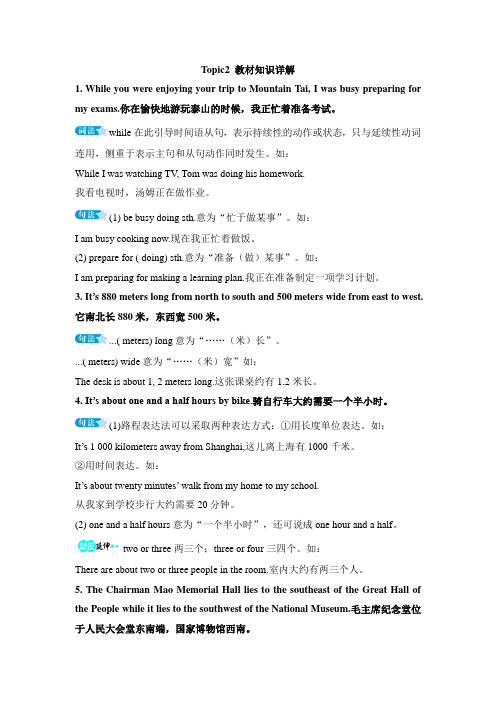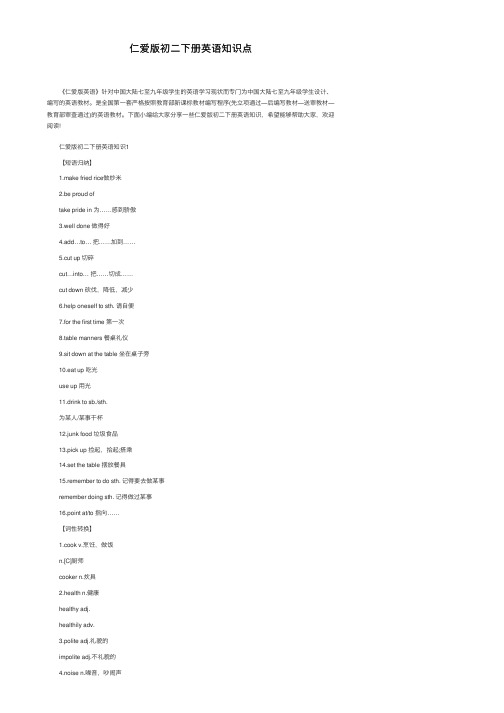2020年仁爱英语八年级下册知识点2
仁爱版八年级英语下册unit8topic2知识点

Unit 8 Topic 2 知识点1.make sth.制作某物。
Did you make that dress yourself 那件衣服是你自己做的吗Make 与do 的区别:两者都有“做”的意思。
Make 表示做出以前并不存在的事物如:paper is made from wood 。
纸是由木材做成的。
而do 是强调动作。
如: What are you doing 你在做什么2.allow sb. to do sth. 允许某人做某事。
allow doing sth. 允许做某事。
3.it is +adj. +that 从句。
4.show sth. 展示某物。
Show sb. sth.= show sth. to sb. 把…指给….看,出示。
5.agree with … 同意…;agree to do sth. 同意去做某事;agree that … 同意…6.stop …from doing sth. 阻止…做某事,相当于keep/prevent…from doing sth.7.take off 脱下,脱掉,起飞your socks are very dirty ,please take them off 。
你的袜子很脏,请脱下来。
The plane will take off in an hour。
飞机将在一个小时后起飞。
8.it is +adj. +that 从句,it 是形式主语,真正的主语是由that 引导的从句。
9.on every occasion 在每一个场合,occasion 为可数名词。
10.dress 给…穿上衣服。
Put on 表示穿(戴)上的动作,wear 后接衣、袜、鞋、帽或手表、眼镜、饰物等;have …on…不能用进行时;be in …接服装、材料、颜色等;in …还可作定语;dress sb /oneself 给别人/自己穿衣服;dressed sb in …给某人穿上…衣服;dress up (sb.)(in…)着装,打扮,可分开用。
仁爱版2020八年级英语下册知识归纳

Unit 5Feeling Excited Topic1: I’m so happy.1. How are you doing?=How are you? 你好吗?2 .invite sb. to do sth= ask sb. to do邀请某人做某事3.for sth准备某事(准备时间较长思想上的准备):prepare for the examprepare sth for sb.为某人准备…:prepare food for Lily to do sh准备做…:I prepare to go hiking.4.say sth to sb.对某人说….:say thanks/hello/goodbye to Peter5.系动词+adj.系表结构①be (am/is/are/was/were)②感官v.(feel, look, sound, taste品尝,smell闻、嗅)③四变化(turn/become/go/ get) *turn侧指颜色变化④keep, make7. a ticket to/for…一张…的票the answer to the question问题的答案the key to the door/car/bike/…a way to…一种…的方式8. be+ adj. + 介词结构be proud of自豪,骄傲be worried about; 担心……be interested in; 对……感兴趣be surprised at; 对……感到惊奇be strict with sb. 对……某人严格10. set the table for sb.为某人摆餐具 e.g. I’m setting the table for guests.我希望一切顺利。
12. be able to do能够---侧指通过努力能够实现的(*will be able to)can---侧指人所具有的一种能力13. ring up sb. = call sb. = phone sb. =give sb. a call打电话14. one of +the +adj最高级+N复+V单:“其中最…之一”e.g. It is one of the most interesting books.15. lonely—“孤单、寂寞”,强调精神上的孤单、寂寞,但未必一个人alone—“单独”,强调一个人独处‘但精神上未必寂寞。
仁爱英语八年级下册知识点归纳(2)

仁爱英语八年级下册知识点归纳(2)仁爱英语八年级下册知识点归纳:Unit 7know about 了解turn to sb.= turn to sb. for help= ask sb. for help 向某人求助get in touch with sb. 与某人取得联系keep in touch with sb. 与某人保持联系lose in touch with sb. 与某人失去联系think about 思考think over 仔细思考think of 认为try one’s best to do sth. 尽某人最大的努力做某事have a sweet tooth 爱吃甜食enough的用法:名前形副后,注意到底是用形容词还是副词与enough搭配decide to do sth. 决定做某事regret to do:遗憾得去做某事; regret doing: 遗憾做了某事forget to do: 忘记要去做某事; forget doing: 忘记做过某事remember to do: 记得要去做某事; remember doing: 记得做过某事这三个词后面都可以接that引导的宾语从句。
instead of : 代替,而不是。
接动词的话要用动词的ing形式。
play for:效力于,为…打比赛play against: 与…对打;与某个队打比赛fight for: 为…而战fight against: 与…作斗争,与…对抗as a result 结果with no roofs and walls= without roofs and wallsWell done! 做得好!add sth. to sth: 把某物加入某物里cooked meat 熟肉 boiled water: 开水 boiling water: 正在沸腾的水描述做一件事情的步骤:First,next,then, finally。
仁爱版英语八下Topic2_教材知识详解

Topic2 教材知识详解1.While you were enjoying your trip to Mountain Tai, I was busy preparing for my exams.你在愉快地游玩泰山的时候,我正忙着准备考试。
while在此引导时间语从句,表示持续性的动作或状态,只与延续性动词连用,侧重于表示主句和从句动作同时发生。
如:While I was watching TV, Tom was doing his homework.我看电视时,汤姆正在做作业。
(1) be busy doing sth.意为“忙于做某事”。
如:I am busy cooking now.现在我正忙着做饭。
(2) prepare for ( doing) sth.意为“准备(做)某事”。
如:I am preparing for making a learning plan.我正在准备制定一项学习计划。
3. It’s 880 meters long from north to south and 500 meters wide from east to west.它南北长880米,东西宽500米。
...( meters) long意为“……(米)长”。
...( meters) wide意为“……(米)宽”如:The desk is about 1, 2 meters long.这张课桌约有1.2米长。
4.It’s about one and a half hours by bike.骑自行车大约需要一个半小时。
(1)路程表达法可以采取两种表达方式:①用长度单位表达。
如:It’s 1 000 kilometers away from Shanghai,这儿离上海有1000千米。
②用时间表达。
如:It’s about twenty minutes’ walk from my home to my school.从我家到学校步行大约需要20分钟。
仁爱版初二下册英语知识点

仁爱版初⼆下册英语知识点《仁爱版英语》针对中国⼤陆七⾄九年级学⽣的英语学习现状⽽专门为中国⼤陆七⾄九年级学⽣设计、编写的英语教材。
是全国第⼀套严格按照教育部新课标教材编写程序(先⽴项通过—后编写教材—送审教材—教育部审查通过)的英语教材。
下⾯⼩编给⼤家分享⼀些仁爱版初⼆下册英语知识,希望能够帮助⼤家,欢迎阅读!仁爱版初⼆下册英语知识1【短语归纳】1.make fried rice做炒⽶2.be proud oftake pride in 为……感到骄傲3.well done 做得好4.add…to… 把……加到……5.cut up 切碎cut…into… 把……切成……cut down 砍伐,降低,减少6.help oneself to sth. 请⾃便7.for the first time 第⼀次8.table manners 餐桌礼仪9.sit down at the table 坐在桌⼦旁10.eat up 吃光use up ⽤光11.drink to sb./sth.为某⼈/某事⼲杯12.junk food 垃圾⾷品13.pick up 捡起,拾起;搭乘14.set the table 摆放餐具15.remember to do sth. 记得要去做某事remember doing sth. 记得做过某事16.point at/to 指向……【词性转换】1.cook v.烹饪,做饭n.[C]厨师cooker n.炊具2.health n.健康healthy adj.healthily adv.3.polite adj.礼貌的impolite adj.不礼貌的4.noise n.噪⾳,吵闹声noisy adj.吵闹的,聒噪的noisily adv.5.quiet adj.安静的,寂静的quietly adv.6.eating habits 饮⾷习惯【重点句型】1.It’s very kindof you.你真是太善良了(It’s +adj.+of sb. to do sth.)2.What do I need to do after that?接下来我需要做什么?3.I’m not sure whether I can cook it well.我不确定我是否能把它做好。
仁爱版英语八年级下册知识点汇总[2]
![仁爱版英语八年级下册知识点汇总[2]](https://img.taocdn.com/s3/m/56ebf89da26925c52dc5bf31.png)
(完整word版)仁爱版英语八年级下册知识点汇总(word版可编辑修改) 编辑整理:尊敬的读者朋友们:这里是精品文档编辑中心,本文档内容是由我和我的同事精心编辑整理后发布的,发布之前我们对文中内容进行仔细校对,但是难免会有疏漏的地方,但是任然希望((完整word版)仁爱版英语八年级下册知识点汇总(word版可编辑修改))的内容能够给您的工作和学习带来便利。
同时也真诚的希望收到您的建议和反馈,这将是我们进步的源泉,前进的动力。
本文可编辑可修改,如果觉得对您有帮助请收藏以便随时查阅,最后祝您生活愉快业绩进步,以下为(完整word版)仁爱版英语八年级下册知识点汇总(word版可编辑修改)的全部内容。
Unit5 feeling happyTopic 1 why all the smiling faces?一、重点词汇1、cruel 残忍的2、 silly 傻的3、smile 微笑4、rich 富裕的5、proud 骄傲的6、taste 品尝7、smell 问起来 8、set 设置 9、able 能够10、since 自从.。
11、lively 活泼的 12、play 玩13、mad 发疯的 14、please 请;令人高兴的 15、marry 结婚16、main 主要的 17、role 角色 18、express 表达19、culture 文化 20、peace 和平二、重点短语1 Why all the smiling faces? 为什么你们都笑容满面。
2 You look so excited. 你看起来很兴奋。
3 invite/ ask sb to do sth 邀请某人做某事4 one of 其中之一5 prepare sth for sb= get sth ready for sb 为某人准备好某事6 say thanks / hello / sorry / goodbye to sb 向某人说声谢谢/ 你好/抱歉/再见7 None of 没有一个8 What a shame / pity. 真遗憾.9 get the ticket to = buy the ticket for 买到。
英语仁爱版八年级下册知识点总结
知识点一:Unit 1 Leisure Time Activities1.1 词汇:watch TV, playputer games, play the guitar, play basketball, go shopping, and so on1.2 语法:使用动词不定式作宾语1.3 句型:What do you usually do on weekends?1.4 话题:How to spend leisure time wisely知识点二:Unit 2 Healthy Eating2.1 词汇:junk food, balanced diet, nutrients, digestion, and so on2.2 语法:there be 句型2.3 句型:There is some milk in the fridge.2.4 话题:The importance of healthy eating habits知识点三:Unit 3 Travel Journal3.1 词汇:passport, visa, luggage, destination, arrival, departure, and so on3.2 语法:使用情态动词表达推测和建议3.3 句型:We may need a map to find the hotel.3.4 话题:The benefits of traveling and experiencing different cultures知识点四:Unit 4 Making the News4.1 词汇:reporter, headline, journalist, article, interview, and so on4.2 语法:使用虚拟语气表示假设4.3 句型:If I were you, I would follow the latest news.4.4 话题:The role of media in shaping public opinion——《英语仁爱版八年级下册知识点总结》1. 介绍英语作为一门国际通用语言,对于提高个人综合素质和竞争力具有重要意义。
仁爱版八年级英语unit2知识点总结
仁爱版八年级英语unit2知识点总结Unit 2 Knowledge Points Summary for Renai Version 8th Grade EnglishUnit 2 of the Renai Version 8th Grade English textbook covers a wide range of topics and language skills. In this article, we will summarize the key knowledge points for this unit.1. Vocabulary and ExpressionsThe unit introduces various new vocabulary items and expressions. Some examples are:- narrow-minded, tolerant, open-minded, broad-minded- predict, forecast, estimate- senior, junior, sophomore, freshman- preference, option, choice, decisionWhen studying new vocabulary, it's important to pay attention to word form, pronunciation, and usage in context.2. Grammar and Sentence StructuresUnit 2 focuses on several important grammatical and structural points, including:- Using comparative and superlative adjectives to make comparisons, e.g. "She is taller than her sister. Her sister is the shortest in the class."- Using the present continuous tense to talk about ongoing actions, e.g. "She is listening to music right now."- Using modal verbs to express ability, possibility, and permission, e.g. "I can speak French. You may borrow my book."It's important to practice using different sentence structures to become more proficient in English.3. Reading and Writing SkillsUnit 2 provides opportunities for students to practice reading and writing skills, such as:- Reading different types of texts, such as biographies, newspaper articles, and opinion pieces- Identifying main ideas, supporting details, and inferences in a text- Writing coherent paragraphs with a topic sentence, supporting sentences, and a concluding sentence- Using transition words and phrases to connect ideas within a paragraph or between paragraphsTo improve reading and writing skills, it's important to develop good reading habits and practice writing regularly.4. Listening and Speaking SkillsUnit 2 includes various listening and speaking activities to help students practice communication skills, such as:- Listening for specific information, such as dates, names, or locations- Participating in group discussions or debates on a topic- Using appropriate tone, vocabulary, and body language in different contexts- Giving presentations or speeches on a topic of interestTo improve listening and speaking skills, it's important to practice regularly with different types of audio and video materials, and to seek feedback from teachers, peers, or language partners.5. Cultural AwarenessFinally, Unit 2 also includes some cultural awareness activities to help students understand and appreciate different cultures and lifestyles. Some examples are:- Researching and presenting on a famous person from a different country or culture- Discussing different attitudes towards education, family, or social issues- Comparing and contrasting different holiday traditions or customs around the worldLearning about different cultures can broaden our perspectives and help us become more empathetic and understanding individuals.Overall, Unit 2 of the Renai Version 8th Grade English textbook offers a comprehensive and engaging learning experience for students, covering different language skills, cultural topics, and real-world applications. By mastering the knowledge points summarized in this article, students can become more confident and competent English learners.。
仁爱版八年级英语下册知识点
仁爱版八年级英语下册知识点仁爱版八年级英语下册知识点概述一、语法重点1. 时态- 一般将来时:用于描述将要发生的动作或状态。
- 现在完成时:表示过去发生的动作对现在造成的影响或结果。
2. 语态- 被动语态:强调动作的承受者,而不是动作的执行者。
3. 非谓语动词- 动名词:作为名词使用,可以作主语、宾语等。
- 分词:现在分词和过去分词,用作形容词或副词。
4. 情态动词- can/could, may/might, must, should/ought to等,表达可能性、义务、建议等。
5. 定语从句- 关系代词who, whom, whose, which, that等引导的从句,用来修饰名词或代词。
6. 状语从句- 时间、条件、原因、结果、让步等状语从句的使用。
7. 直接引语和间接引语- 引述别人的话,注意时态、人称和指示代词的变化。
二、词汇与短语1. 常用词汇- 描述人物特征的形容词,如kind, honest, creative等。
- 描述日常活动的动词短语,如clean up, take out, give up等。
- 与学校生活相关的名词,如classroom, library, project等。
2. 短语动词- look after, turn off, get along with等。
3. 常见搭配- 形容词与名词的搭配,如good habits, heavy rain等。
- 动词与副词的搭配,如finish quickly, study hard等。
三、阅读理解1. 抓住文章主旨- 通过阅读标题、首段和结尾段,快速把握文章大意。
2. 推理判断- 根据上下文线索,推断生词或隐含信息的含义。
3. 细节理解- 通过关键词定位,准确获取文章中的具体信息。
四、写作技巧1. 句型多样性- 使用复合句、并列句等多样化的句型,丰富文章结构。
2. 逻辑连贯- 使用连接词,如however, therefore, moreover等,使文章结构清晰、逻辑性强。
仁爱英语八年级下册知识点总结
仁爱英语八年级下册知识点总结Unit 1: A healthy lifestyle1. Vocabulary: exercise, healthy, diet, balanced, protein, carbohydrate, junk food, fresh, processed, intake, fibre, cholesterol, calorie, obesity2. Grammar: Present Simple and Continuous, Past Simple and Continuous, Future Simple, Time expressions (e.g. always, every day, often, sometimes, usually, on Mondays, at the moment, now, for how long, since when, from….. to…..)Unit 2: Science and Technology1. Vocabulary: innovation, device, satellite, download, upload, surf the internet, browse, search engine, research, experiment, scientific, biological, chemical, nuclear, solar, renewable, solution2. Grammar: Present Simple and Continuous, Past Simple and Continuous, Future Simple, Time expressions, Modal verbs (can, could, may, might, will, shall, would, should, must)Unit 3: Art and Music1. Vocabulary: masterpiece, exhibition, theatre, instrument, orchestra, choir, band, melody, rhythm, harmony, lyrics, composition, composer, sculptor, painter, portrait, landscape2. Grammar: Present Simple and Continuous, Past Simple and Continuous, Future Simple, Time expressions, Adjectives and adverbs, Comparatives and superlativesUnit 4: Literature and the Media1. Vocabulary: novel, fiction, non-fiction, drama, poetry, plot, character, setting, theme, genre, biography, autobiography, journalism, editor, columnist, article, headline, caption, review, feature2. Grammar: Present Simple and Continuous, Past Simple and Continuous, Future Simple, Time expressions, Reported speech, Direct and indirect speech, ConnectorsUnit 5: Our world1. Vocabulary: environment, climate, pollution, deforestation, global warming, greenhouse gases, ozone layer, recycling, renewable energy, conservation, endangered species, sustainable, ecosystem, biodiversity2. Grammar: Present Simple and Continuous, Past Simple and Continuous, Future Simple, Time expressions, Prepositions of time and placeUnit 6: Cities of the future1. Vocabulary: urbanization, infrastructure, skyscraper, transportation, pollution, congestion, overpopulation, futuristic, sustainable, development, technology, innovation, mega city2. Grammar: Present Simple and Continuous, Past Simple and Continuous, Future Simple, Time expressions, Future forms (going to, will, present continuous)Unit 7: Travel and adventure1. Vocabulary: destination, culture, adventure, explore, expedition, journey, tour, trekking, hiking, backpacking, sightseeing, accommodation, itinerary, landmark, souvenir2. Grammar: Present Simple and Continuous, Past Simple and Continuous, Future Simple, Time expressions, Conditional sentences (type 0 and 1)Unit 8: Health and safety1. Vocabulary: emergency, accident, injury, treatment, first aid, hospital, ambulance, paramedic, injury, wound, fracture, concussion, poison, burn, drown, rescue2. Grammar: Present Simple and Continuous, Past Simple and Continuous, Future Simple, Time expressions, Relative clauses, Passive voiceUnit 9: Achievements1. Vocabulary: success, ambition, goal, achievement, determination, effort, talent, skill, competition, prize, medal, challenge, inspiration, role model, mentor, award2. Grammar: Present Simple and Continuous, Past Simple and Continuous, Future Simple, Time expressions, Phrases and clausesUnit 10: Reaching out1. Vocabulary: volunteer, charity, donation, support, cause, fundraising, campaign, community, needy, homeless, orphan, poverty, disaster, aid, relief, organization2. Grammar: Present Simple and Continuous, Past Simple and Continuous, Future Simple, Time expressions, Indirect questionsIn conclusion, the eighth-grade students will learn a variety of vocabulary and grammar points in the English language through the different thematic units in the Ren'ai English curriculum. The topics covered include a healthy lifestyle, science and technology, art and music, literature and the media, our world, cities of the future, travel and adventure, health and safety, achievements, and reaching out. By studying these topics, students will develop their language skills and broaden their knowledge of various subjects.。
